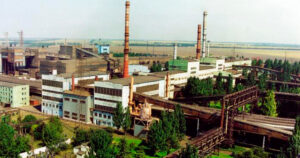
In 2024, PJSC Nikopol Ferroalloy Plant (NFP, Dnipropetrovsk region) increased its net loss by 15.9% compared to 2023, from UAH 2 billion 620.399 million to UAH 3 billion 35.966 million.
According to NZF’s annual report, net income for the past year decreased by 17.7% to UAH 7 billion 813.056 million from UAH 9 billion 493.059 million.
Retained earnings at the end of 2024 reached UAH 4 billion 128.280 million.
As reported, in January-June of this year, NZF reduced its net loss by 69.6% compared to the same period last year, to UAH 458.274 million from UAH 1 billion 505.962 million. In the first half of 2025, NZF increased its net income by 11.7% to UAH 3 billion 915.368 million from UAH 3 billion 505.483 million. Undistributed profit at the end of June 2025 reached UAH 3 billion 778.047 million.
In 2020, the company received a net profit of UAH 456 million 162,764 thousand. In 2021, the company received a net profit of UAH 5 billion 139 million 528,911 thousand. In 2022, NZF received a profit of UAH 910 million 452,147 thousand.
The plant ended 2023 with a net loss of UAH 2 billion 620 million 398,599 thousand.
In addition, it was reported that the Pokrovsky Mining and Processing Plant (PGZK, formerly Ordzhonikidze Mining and Processing Plant) and the Marganetsky Mining and Processing Plant (MGZK, both in Dnipropetrovsk region), which are part of the Privat Group, ceased the extraction and processing of raw manganese ore at the end of October-beginning of November 2023, while NZF and ZZF stopped smelting ferroalloys. In the summer of 2024, ferroalloy plants resumed production at a minimum level.
The business of ZZF, NZF, Stakhanovskyi ZF (located in NKT), Pokrovskyi and Marganetskyi GZK was organized by Privatbank prior to nationalization.
NZF is Ukraine’s largest producer of silicon and ferromanganese. The average monthly output of ferroalloys during stable operation of the enterprise is about 55-60 thousand tons.
According to NDU data for the first quarter of 2025, Sofalon Investments Limitad owns 15.503% of the shares of the private joint-stock company, Rougella Properties Ltd. owns 9.6904%, Dolemia Consulting Ltd. owns 15.7056%, Sonerio Holdings Ltd. holds 9.2158%, Manjalom Limited holds 5.8824%, and Treelon Investments Limited (all based in Cyprus) holds 15.1013%.
The authorized capital of PJSC NZF is UAH 418.915 million.
NZF is controlled by the EastOne group, created in the fall of 2007 as a result of the restructuring of the Interpipe group, as well as the Privat group (both based in Dnipro).
FERROALLOY, LOSS, NIKOPOL, PLANT, НЗФ
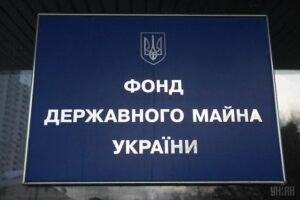
The State Property Fund (SPF) of Ukraine has put up for auction in the Prozorro.Prozori system 100% of the state-owned shares of JSC “Radiorele Plant” (Kharkiv) at a starting price of UAH 234.4 million, which is twice the price at the repeat auction in February this year, which did not take place.
According to the SPF, the online auction is scheduled for October 28.
The property includes 5 units of real estate (non-residential buildings, warehouses, workshops, etc.) with a total area of 49.14 thousand square meters, 12 units of vehicles and special equipment manufactured between 1983 and 2013, one of which has been transferred to the Armed Forces of Ukraine.
The company’s balance sheet also includes 3.51 thousand items of equipment, furniture, inventory, 114 items of technical literature, and 41 intangible assets.
In addition, as of September 15, 2025, part of the real estate with a total area of 479.4 square meters has been leased.
According to the terms of the tender, the buyer of JSC “Radio Relay Plant” is obliged to pay off debts on wages and to the budget within six months from the date of transfer of ownership, as well as to prevent the dismissal of employees (as of June 30, 2025, 57 people worked at the plant).
The plant’s main product range consists of low-current, miniature electromagnetic relays.
According to information from the State Property Fund, as of June 30, 2025, overdue accounts payable amounted to UAH 2.512 million, including UAH 1.28 million in wages, UAH 0.14 million in insurance, and no wages.
In January-June 2025, the plant incurred losses of UAH 5.7 million (UAH 10.3 million for the whole of 2024) and net income of UAH 2.3 million (UAH 5.2 million). The average monthly salary was UAH 10,900 (UAH 10,200).
The plant’s sales volume for the period from 2022 to the first six months of 2025 amounted to UAH 23.1 million, including exports of UAH 6.8 million.
As reported, in early February 2025, the State Property Fund of Ukraine put up for auction the state-owned stake in JSC Radio Relay Plant, but after it failed to take place due to the absence of participants, the price was halved at a repeat auction to UAH 117.2 million, which also failed to take place.
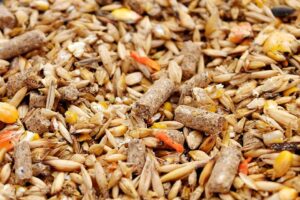
Investment company EFI Group, founded by Igor Lisky, together with its partners, has announced the start of construction of the Feednova Center (Feednova TM) plant for the production of high-protein feed additives and animal fats in the Cherkasy region.
“Despite the war, Ukrainian businesses are investing EUR 14.4 million in the first phase of the project. Total investments are planned to exceed EUR 20 million,” according to a press release on Tuesday.
According to the release, the majority investor is EFI Group, together with its strategic partner, leading Dutch and Danish manufacturers of technology and equipment in the processing industry.
The enterprise will include four production lines that will allow processing more than 150 tons of raw materials per day and producing more than 50 tons of finished products: meat and bone meal, feather meal, blood meal, and animal fats. The plant is scheduled to launch in the third quarter of 2026.
According to Samvel Ramazyan, director of Fidnova Center LLC, the design of the plant has already been completed and a general contractor has been selected, whose name is not disclosed in the release.
The Ministry of Economy, Environment, and Agriculture said in a press release on Tuesday that Fidnova Center will be the first project in Ukraine to receive compensation for the cost of constructed engineering and transport infrastructure facilities as early as 2025, with the total amount of state support estimated at UAH 172.1 million.
To date, the Ministry of Economy has provided the investor with a conclusion on the feasibility of the project, and the order to sign an agreement between the state and the investor is currently being approved by the central executive authorities. An agreement between the investor and the state will be signed in the near future, the ministry said.
The new facility will be the second plant under the Feednova brand after the successful launch of the first plant in the Lviv region in 2021, according to the release. The company exports more than 80% of its products to EU countries and continues its own development through the introduction of new production lines and the implementation of energy efficiency projects.
“The second plant for the production of high-protein additives is critically important for the modern meat processing industry. We are creating an infrastructure for efficient processing that simultaneously reduces environmental risks, creates jobs, and generates added value within the country. The Cherkasy region is the ideal location for this plant: it has strong agricultural enterprises, logistics, and, most importantly, the support of the local community,” Liska said in the release.
It is noted that the enterprise will create more than 80 jobs in the community and should influence the development of agro-industrial complexes in the region, as it will be the first in the central part of the country to process raw materials from external suppliers.
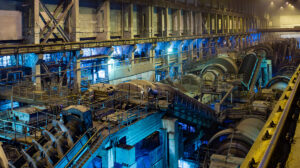
Due to the full-scale war, the mining and metallurgical group Metinvest reduced its annual revenue from $10-12 billion to $5-6 billion, while remaining a profitable company, its CEO Yuriy Ryzhenkov said in an interview with the British newspaper The Times.
The war has significantly affected the financial performance of Metinvest, which sells a significant portion of its metal products in Ukraine and exports iron ore, flat-rolled products, and semi-finished products to 51 countries, including China, India, and the US.
According to Ryzhenkov, “before the war, the business usually had an annual income of $10-12 billion, and now this figure is around $5-6 billion. Despite this, the company remains profitable, and the CEO considers the impact of Trump’s tariffs to be insignificant.”
At the same time, it is noted that Metinvest’s largest enterprises were bombed and put out of operation, including the Mariupol metallurgical plants, which were one of the first battlefields. Metinvest’s revenue has halved, and its workforce has shrunk to around 50,000. Tens of thousands of people have lost their jobs at the group’s enterprises; 8,000 are now serving in the Armed Forces, and 764 employees have been killed.
Despite these losses, top management has managed to keep those who remained in the company motivated. Metinvest is one of the largest private donors to the Ukrainian army, and its steel is used for shelters and military equipment.
“Employees feel that they are part of the resistance. And they are proud of it,” said the CEO.
Metinvest is a vertically integrated group of mining and metallurgical enterprises. Its enterprises are located in Ukraine—in the Donetsk, Luhansk, Zaporizhzhia, and Dnipropetrovsk regions—as well as in the European Union, the United Kingdom, and the United States. The main shareholders of the holding are SCM Group (71.24%) and Smart Holding (23.76%). Metinvest Holding LLC is the managing company of the Metinvest Group.
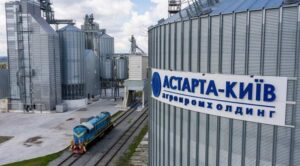
Astarta, Ukraine’s largest sugar producer, intends to continue investing in the construction of its soy protein concentrate plant in 2026. These investments will amount to approximately EUR40 million, said Vyacheslav Chuk, director of commercial operations and strategic marketing at the agricultural holding.
“Our budget process is not yet complete, but the agricultural holding will definitely invest in the completion of our new project to build a soy protein concentrate plant. This is about EUR40 million, and the rest is maintenance, which will vary depending on what we focus on,” he said at the Forbes Agro 2025 conference in Kyiv on Friday.
Responding to a follow-up question about how much Astarta will invest during the year to resolve current issues, Chuk said it could be tens of millions of dollars.
In 2024, Astarta began investing in the construction of a plant for processing soybean meal into soybean protein concentrate with a capacity of 500 tons/day (about 100,000 tons per year) in the Hlobyn industrial complex (Poltava region). The agricultural holding is investing more than EUR 76 million in the purchase of equipment and technologies and will create 110 new jobs.
Astarta and its structural unit Astarta Agro Protein signed the first investment agreement with the Ukrainian government to receive compensation from the state for significant investments. Under the agreement, the state will provide the agricultural holding with a number of incentives, including exemption from import duties on new equipment, import VAT on new equipment, and income tax for up to five years.
Astarta is a vertically integrated agro-industrial holding company operating in eight regions of Ukraine and is the largest sugar producer in Ukraine. It comprises six sugar factories, agricultural enterprises with a land bank of 220,000 hectares, dairy farms with 22,000 head of cattle, an oil extraction plant in Hlobine (Poltava region), seven elevators, and a biogas complex.
In the first nine months of 2024, Astarta increased its net profit by 35.1% compared to the same period in 2023, to EUR75.60 million. The agricultural holding’s revenue grew by 12.6% to EUR441.46 million, and EBITDA by 12.8% to $131.56 million.
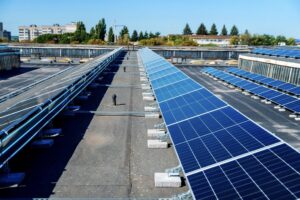
A large Ukrainian manufacturer of heating devices and equipment for heating systems (TM Termia), JSC Vinnytsia Mayak Plant, has installed its own solar power plant (SPP), according to Andriy Ocheretny, deputy head of the Vinnytsia City Council.
“The SPP was launched on September 19, 2025. A total of 384 solar panels were installed. The peak capacity is 236.16 kW,” he wrote on Facebook on Thursday.
As specified by City Council Deputy Vyacheslav Terlikovsky, the enterprise took advantage of the Vinnytsia City Council’s program to compensate for the cost of equipment from renewable energy sources.
According to him, the installation of the SES was carried out by Promavtomatika Vinnytsia LLC, which will also provide further maintenance.
The Mayak plant, under the Termia trademark, manufactures, among other things, air heating units (heat guns, fan heaters, air curtains), electric convectors, electric boilers, and heating radiators.
According to the company’s annual report on its website, in 2024, its consolidated net profit decreased by 2.4 times compared to 2023, to UAH 7.6 million, and net income decreased by 10%, to UAH 251.6 million.
Ocheretny also reported that an application for compensation from the Vinnytsia City Council for the purchase of equipment for the production of electricity from renewable sources was submitted by PP “Konex,” which specializes in the trade of pharmaceutical products.
“PP Konex now also has its own solar power plant with a total capacity of 60 kW. In total, 108 panels (560 W each) and 20 storage batteries (5.12 kW each) are installed on the roof of the enterprise,” he wrote.
According to its website, the Konex pharmacy chain has more than 200 pharmacies in the Vinnytsia, Khmelnytskyi, Chernivtsi, Cherkasy, Kirovohrad, Zhytomyr, Ivano-Frankivsk, Kyiv, Rivne, Ternopil, and Odesa regions.
According to its report, Konex earned UAH 51.8 million in net profit and UAH 3.5 billion in revenue in 2024.